Corporate Social Responsibility and Sustainable Practices in Business and Management
VerifiedAdded on 2021/01/01
|14
|4640
|138
AI Summary
CONTEMPORARY DEVELOPMENTS IN BUSINESS AND MANAGEMENT INTRODUCTION 1 INTRODUCTION 2 Company overview 2 TASK 12 Overview of the primary external influence2 Porters five forces analysis 4 TASK 25 I) Relevancy of Corporate social responsibility and sustainability and its influence on policies and decision making of DHL5 ii) Effectiveness of business operations with regard to CSR and sustainable practices8 Iii) Improvement areas in relation to CSR and sustainable practices 9 CONCLUSION 10 REFERENCES 11 INTRODUCTION Contemporary
Contribute Materials
Your contribution can guide someone’s learning journey. Share your
documents today.
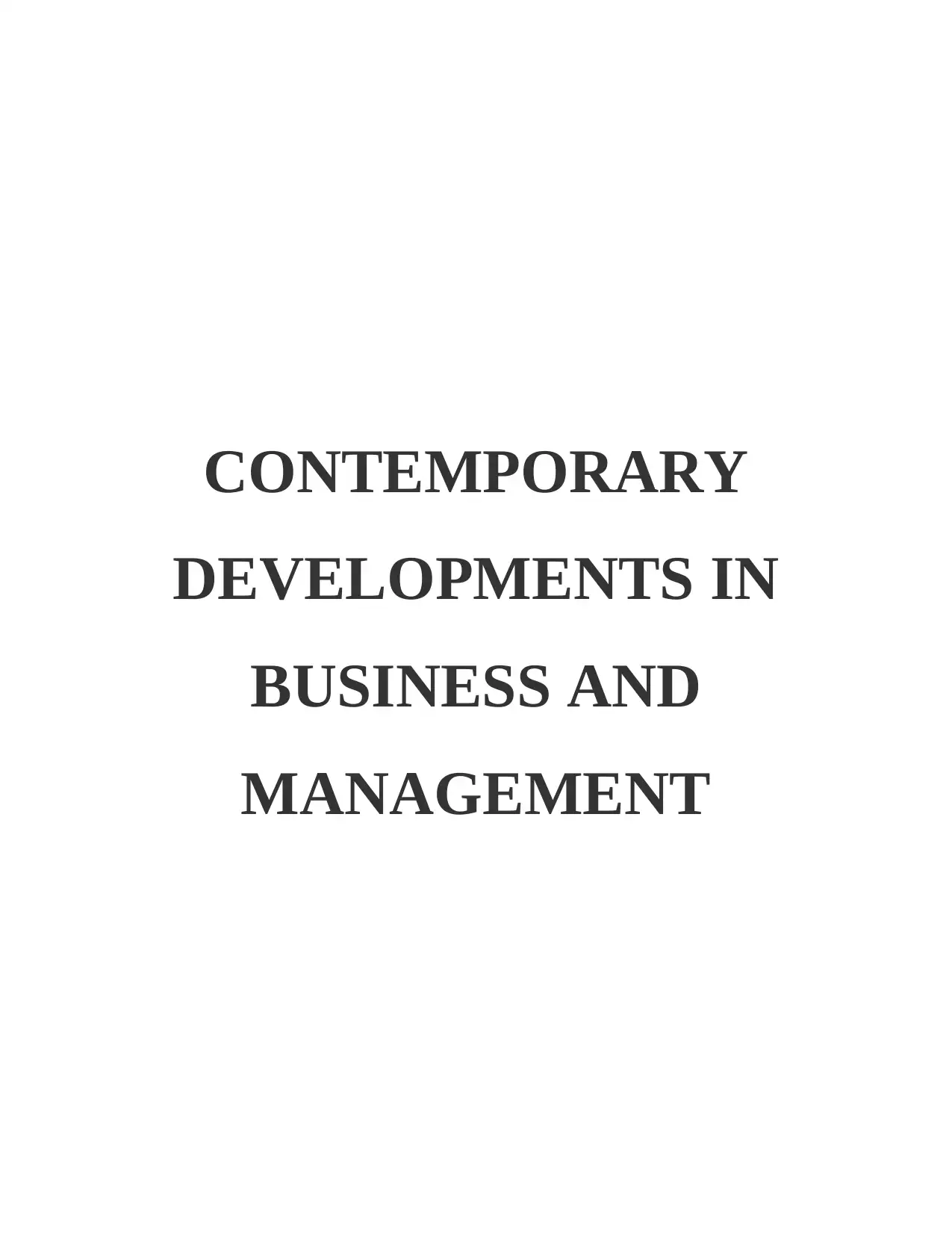
CONTEMPORARY
DEVELOPMENTS IN
BUSINESS AND
MANAGEMENT
DEVELOPMENTS IN
BUSINESS AND
MANAGEMENT
Secure Best Marks with AI Grader
Need help grading? Try our AI Grader for instant feedback on your assignments.
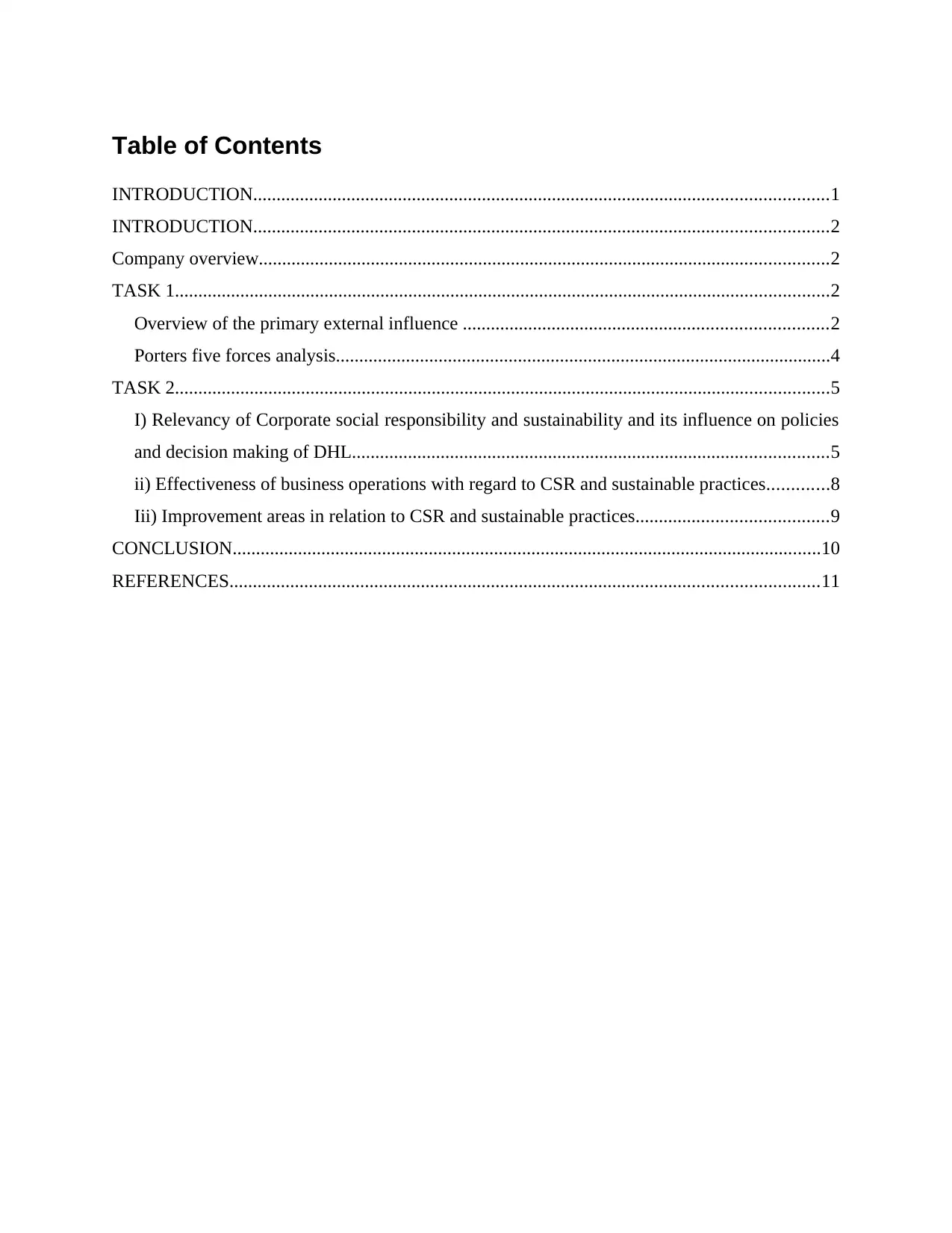
Table of Contents
INTRODUCTION...........................................................................................................................1
INTRODUCTION...........................................................................................................................2
Company overview..........................................................................................................................2
TASK 1............................................................................................................................................2
Overview of the primary external influence ..............................................................................2
Porters five forces analysis..........................................................................................................4
TASK 2............................................................................................................................................5
I) Relevancy of Corporate social responsibility and sustainability and its influence on policies
and decision making of DHL......................................................................................................5
ii) Effectiveness of business operations with regard to CSR and sustainable practices.............8
Iii) Improvement areas in relation to CSR and sustainable practices.........................................9
CONCLUSION..............................................................................................................................10
REFERENCES..............................................................................................................................11
INTRODUCTION...........................................................................................................................1
INTRODUCTION...........................................................................................................................2
Company overview..........................................................................................................................2
TASK 1............................................................................................................................................2
Overview of the primary external influence ..............................................................................2
Porters five forces analysis..........................................................................................................4
TASK 2............................................................................................................................................5
I) Relevancy of Corporate social responsibility and sustainability and its influence on policies
and decision making of DHL......................................................................................................5
ii) Effectiveness of business operations with regard to CSR and sustainable practices.............8
Iii) Improvement areas in relation to CSR and sustainable practices.........................................9
CONCLUSION..............................................................................................................................10
REFERENCES..............................................................................................................................11
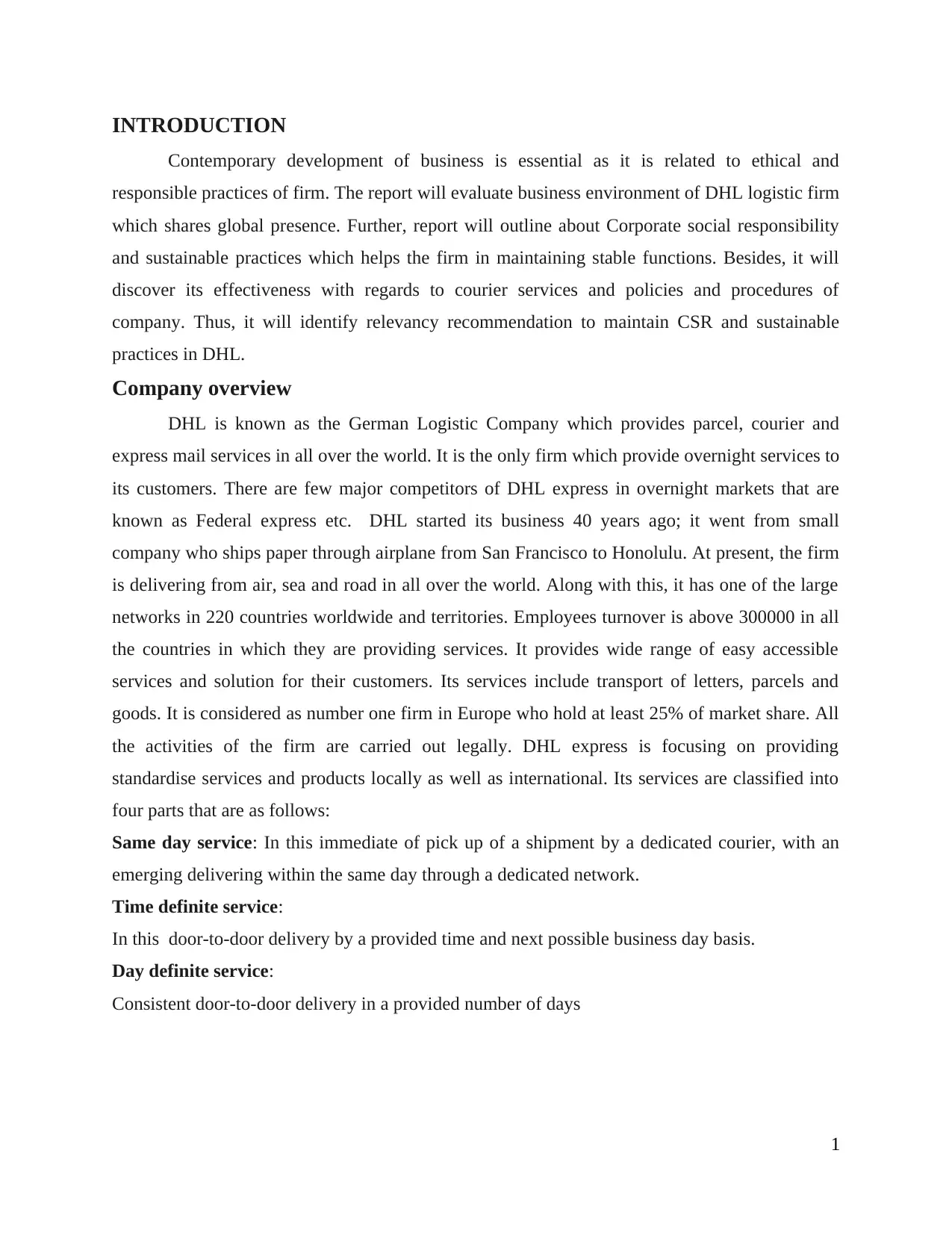
INTRODUCTION
Contemporary development of business is essential as it is related to ethical and
responsible practices of firm. The report will evaluate business environment of DHL logistic firm
which shares global presence. Further, report will outline about Corporate social responsibility
and sustainable practices which helps the firm in maintaining stable functions. Besides, it will
discover its effectiveness with regards to courier services and policies and procedures of
company. Thus, it will identify relevancy recommendation to maintain CSR and sustainable
practices in DHL.
Company overview
DHL is known as the German Logistic Company which provides parcel, courier and
express mail services in all over the world. It is the only firm which provide overnight services to
its customers. There are few major competitors of DHL express in overnight markets that are
known as Federal express etc. DHL started its business 40 years ago; it went from small
company who ships paper through airplane from San Francisco to Honolulu. At present, the firm
is delivering from air, sea and road in all over the world. Along with this, it has one of the large
networks in 220 countries worldwide and territories. Employees turnover is above 300000 in all
the countries in which they are providing services. It provides wide range of easy accessible
services and solution for their customers. Its services include transport of letters, parcels and
goods. It is considered as number one firm in Europe who hold at least 25% of market share. All
the activities of the firm are carried out legally. DHL express is focusing on providing
standardise services and products locally as well as international. Its services are classified into
four parts that are as follows:
Same day service: In this immediate of pick up of a shipment by a dedicated courier, with an
emerging delivering within the same day through a dedicated network.
Time definite service:
In this door-to-door delivery by a provided time and next possible business day basis.
Day definite service:
Consistent door-to-door delivery in a provided number of days
1
Contemporary development of business is essential as it is related to ethical and
responsible practices of firm. The report will evaluate business environment of DHL logistic firm
which shares global presence. Further, report will outline about Corporate social responsibility
and sustainable practices which helps the firm in maintaining stable functions. Besides, it will
discover its effectiveness with regards to courier services and policies and procedures of
company. Thus, it will identify relevancy recommendation to maintain CSR and sustainable
practices in DHL.
Company overview
DHL is known as the German Logistic Company which provides parcel, courier and
express mail services in all over the world. It is the only firm which provide overnight services to
its customers. There are few major competitors of DHL express in overnight markets that are
known as Federal express etc. DHL started its business 40 years ago; it went from small
company who ships paper through airplane from San Francisco to Honolulu. At present, the firm
is delivering from air, sea and road in all over the world. Along with this, it has one of the large
networks in 220 countries worldwide and territories. Employees turnover is above 300000 in all
the countries in which they are providing services. It provides wide range of easy accessible
services and solution for their customers. Its services include transport of letters, parcels and
goods. It is considered as number one firm in Europe who hold at least 25% of market share. All
the activities of the firm are carried out legally. DHL express is focusing on providing
standardise services and products locally as well as international. Its services are classified into
four parts that are as follows:
Same day service: In this immediate of pick up of a shipment by a dedicated courier, with an
emerging delivering within the same day through a dedicated network.
Time definite service:
In this door-to-door delivery by a provided time and next possible business day basis.
Day definite service:
Consistent door-to-door delivery in a provided number of days
1
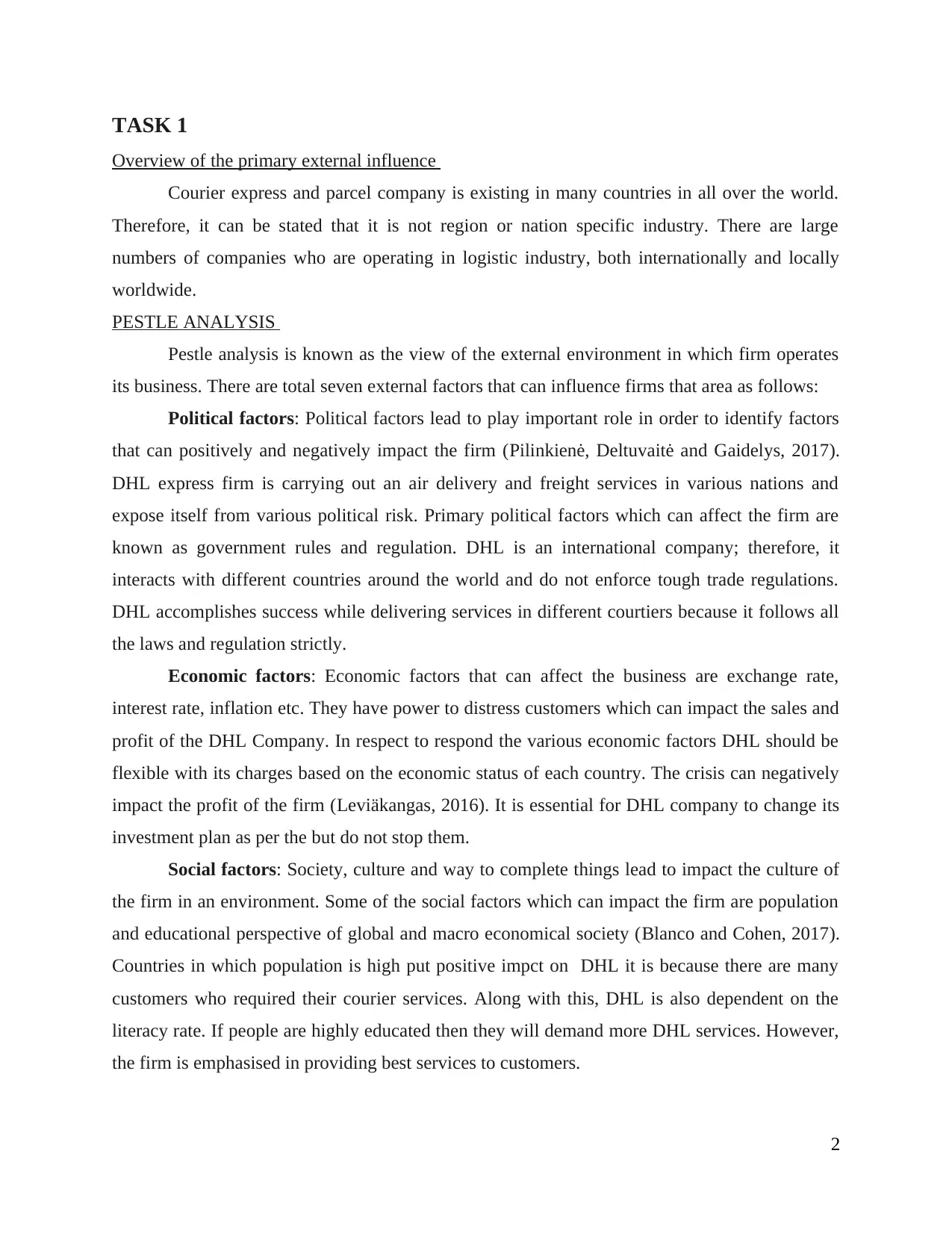
TASK 1
Overview of the primary external influence
Courier express and parcel company is existing in many countries in all over the world.
Therefore, it can be stated that it is not region or nation specific industry. There are large
numbers of companies who are operating in logistic industry, both internationally and locally
worldwide.
PESTLE ANALYSIS
Pestle analysis is known as the view of the external environment in which firm operates
its business. There are total seven external factors that can influence firms that area as follows:
Political factors: Political factors lead to play important role in order to identify factors
that can positively and negatively impact the firm (Pilinkienė, Deltuvaitė and Gaidelys, 2017).
DHL express firm is carrying out an air delivery and freight services in various nations and
expose itself from various political risk. Primary political factors which can affect the firm are
known as government rules and regulation. DHL is an international company; therefore, it
interacts with different countries around the world and do not enforce tough trade regulations.
DHL accomplishes success while delivering services in different courtiers because it follows all
the laws and regulation strictly.
Economic factors: Economic factors that can affect the business are exchange rate,
interest rate, inflation etc. They have power to distress customers which can impact the sales and
profit of the DHL Company. In respect to respond the various economic factors DHL should be
flexible with its charges based on the economic status of each country. The crisis can negatively
impact the profit of the firm (Leviäkangas, 2016). It is essential for DHL company to change its
investment plan as per the but do not stop them.
Social factors: Society, culture and way to complete things lead to impact the culture of
the firm in an environment. Some of the social factors which can impact the firm are population
and educational perspective of global and macro economical society (Blanco and Cohen, 2017).
Countries in which population is high put positive impct on DHL it is because there are many
customers who required their courier services. Along with this, DHL is also dependent on the
literacy rate. If people are highly educated then they will demand more DHL services. However,
the firm is emphasised in providing best services to customers.
2
Overview of the primary external influence
Courier express and parcel company is existing in many countries in all over the world.
Therefore, it can be stated that it is not region or nation specific industry. There are large
numbers of companies who are operating in logistic industry, both internationally and locally
worldwide.
PESTLE ANALYSIS
Pestle analysis is known as the view of the external environment in which firm operates
its business. There are total seven external factors that can influence firms that area as follows:
Political factors: Political factors lead to play important role in order to identify factors
that can positively and negatively impact the firm (Pilinkienė, Deltuvaitė and Gaidelys, 2017).
DHL express firm is carrying out an air delivery and freight services in various nations and
expose itself from various political risk. Primary political factors which can affect the firm are
known as government rules and regulation. DHL is an international company; therefore, it
interacts with different countries around the world and do not enforce tough trade regulations.
DHL accomplishes success while delivering services in different courtiers because it follows all
the laws and regulation strictly.
Economic factors: Economic factors that can affect the business are exchange rate,
interest rate, inflation etc. They have power to distress customers which can impact the sales and
profit of the DHL Company. In respect to respond the various economic factors DHL should be
flexible with its charges based on the economic status of each country. The crisis can negatively
impact the profit of the firm (Leviäkangas, 2016). It is essential for DHL company to change its
investment plan as per the but do not stop them.
Social factors: Society, culture and way to complete things lead to impact the culture of
the firm in an environment. Some of the social factors which can impact the firm are population
and educational perspective of global and macro economical society (Blanco and Cohen, 2017).
Countries in which population is high put positive impct on DHL it is because there are many
customers who required their courier services. Along with this, DHL is also dependent on the
literacy rate. If people are highly educated then they will demand more DHL services. However,
the firm is emphasised in providing best services to customers.
2
Secure Best Marks with AI Grader
Need help grading? Try our AI Grader for instant feedback on your assignments.
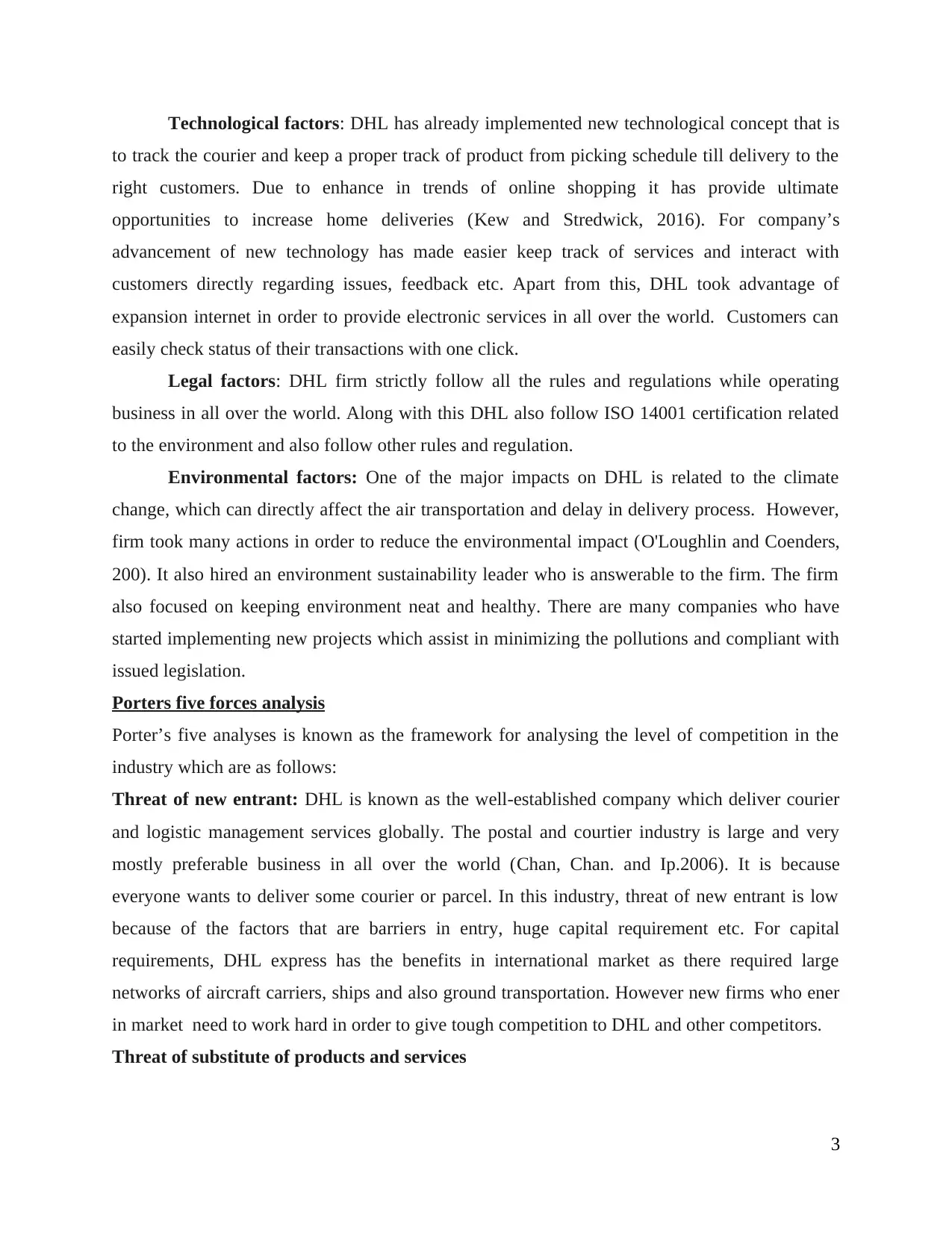
Technological factors: DHL has already implemented new technological concept that is
to track the courier and keep a proper track of product from picking schedule till delivery to the
right customers. Due to enhance in trends of online shopping it has provide ultimate
opportunities to increase home deliveries (Kew and Stredwick, 2016). For company’s
advancement of new technology has made easier keep track of services and interact with
customers directly regarding issues, feedback etc. Apart from this, DHL took advantage of
expansion internet in order to provide electronic services in all over the world. Customers can
easily check status of their transactions with one click.
Legal factors: DHL firm strictly follow all the rules and regulations while operating
business in all over the world. Along with this DHL also follow ISO 14001 certification related
to the environment and also follow other rules and regulation.
Environmental factors: One of the major impacts on DHL is related to the climate
change, which can directly affect the air transportation and delay in delivery process. However,
firm took many actions in order to reduce the environmental impact (O'Loughlin and Coenders,
200). It also hired an environment sustainability leader who is answerable to the firm. The firm
also focused on keeping environment neat and healthy. There are many companies who have
started implementing new projects which assist in minimizing the pollutions and compliant with
issued legislation.
Porters five forces analysis
Porter’s five analyses is known as the framework for analysing the level of competition in the
industry which are as follows:
Threat of new entrant: DHL is known as the well-established company which deliver courier
and logistic management services globally. The postal and courtier industry is large and very
mostly preferable business in all over the world (Chan, Chan. and Ip.2006). It is because
everyone wants to deliver some courier or parcel. In this industry, threat of new entrant is low
because of the factors that are barriers in entry, huge capital requirement etc. For capital
requirements, DHL express has the benefits in international market as there required large
networks of aircraft carriers, ships and also ground transportation. However new firms who ener
in market need to work hard in order to give tough competition to DHL and other competitors.
Threat of substitute of products and services
3
to track the courier and keep a proper track of product from picking schedule till delivery to the
right customers. Due to enhance in trends of online shopping it has provide ultimate
opportunities to increase home deliveries (Kew and Stredwick, 2016). For company’s
advancement of new technology has made easier keep track of services and interact with
customers directly regarding issues, feedback etc. Apart from this, DHL took advantage of
expansion internet in order to provide electronic services in all over the world. Customers can
easily check status of their transactions with one click.
Legal factors: DHL firm strictly follow all the rules and regulations while operating
business in all over the world. Along with this DHL also follow ISO 14001 certification related
to the environment and also follow other rules and regulation.
Environmental factors: One of the major impacts on DHL is related to the climate
change, which can directly affect the air transportation and delay in delivery process. However,
firm took many actions in order to reduce the environmental impact (O'Loughlin and Coenders,
200). It also hired an environment sustainability leader who is answerable to the firm. The firm
also focused on keeping environment neat and healthy. There are many companies who have
started implementing new projects which assist in minimizing the pollutions and compliant with
issued legislation.
Porters five forces analysis
Porter’s five analyses is known as the framework for analysing the level of competition in the
industry which are as follows:
Threat of new entrant: DHL is known as the well-established company which deliver courier
and logistic management services globally. The postal and courtier industry is large and very
mostly preferable business in all over the world (Chan, Chan. and Ip.2006). It is because
everyone wants to deliver some courier or parcel. In this industry, threat of new entrant is low
because of the factors that are barriers in entry, huge capital requirement etc. For capital
requirements, DHL express has the benefits in international market as there required large
networks of aircraft carriers, ships and also ground transportation. However new firms who ener
in market need to work hard in order to give tough competition to DHL and other competitors.
Threat of substitute of products and services
3
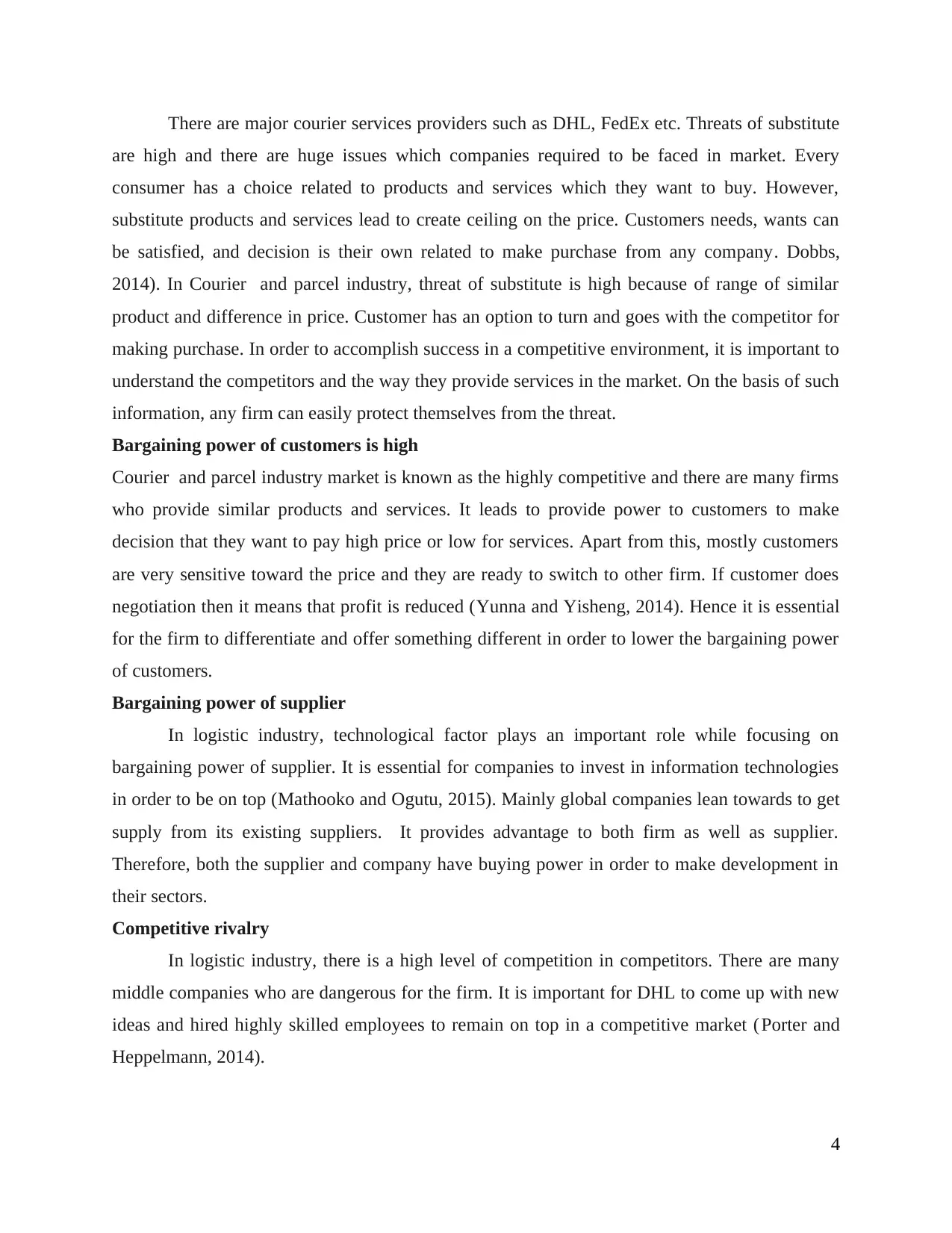
There are major courier services providers such as DHL, FedEx etc. Threats of substitute
are high and there are huge issues which companies required to be faced in market. Every
consumer has a choice related to products and services which they want to buy. However,
substitute products and services lead to create ceiling on the price. Customers needs, wants can
be satisfied, and decision is their own related to make purchase from any company. Dobbs,
2014). In Courier and parcel industry, threat of substitute is high because of range of similar
product and difference in price. Customer has an option to turn and goes with the competitor for
making purchase. In order to accomplish success in a competitive environment, it is important to
understand the competitors and the way they provide services in the market. On the basis of such
information, any firm can easily protect themselves from the threat.
Bargaining power of customers is high
Courier and parcel industry market is known as the highly competitive and there are many firms
who provide similar products and services. It leads to provide power to customers to make
decision that they want to pay high price or low for services. Apart from this, mostly customers
are very sensitive toward the price and they are ready to switch to other firm. If customer does
negotiation then it means that profit is reduced (Yunna and Yisheng, 2014). Hence it is essential
for the firm to differentiate and offer something different in order to lower the bargaining power
of customers.
Bargaining power of supplier
In logistic industry, technological factor plays an important role while focusing on
bargaining power of supplier. It is essential for companies to invest in information technologies
in order to be on top (Mathooko and Ogutu, 2015). Mainly global companies lean towards to get
supply from its existing suppliers. It provides advantage to both firm as well as supplier.
Therefore, both the supplier and company have buying power in order to make development in
their sectors.
Competitive rivalry
In logistic industry, there is a high level of competition in competitors. There are many
middle companies who are dangerous for the firm. It is important for DHL to come up with new
ideas and hired highly skilled employees to remain on top in a competitive market (Porter and
Heppelmann, 2014).
4
are high and there are huge issues which companies required to be faced in market. Every
consumer has a choice related to products and services which they want to buy. However,
substitute products and services lead to create ceiling on the price. Customers needs, wants can
be satisfied, and decision is their own related to make purchase from any company. Dobbs,
2014). In Courier and parcel industry, threat of substitute is high because of range of similar
product and difference in price. Customer has an option to turn and goes with the competitor for
making purchase. In order to accomplish success in a competitive environment, it is important to
understand the competitors and the way they provide services in the market. On the basis of such
information, any firm can easily protect themselves from the threat.
Bargaining power of customers is high
Courier and parcel industry market is known as the highly competitive and there are many firms
who provide similar products and services. It leads to provide power to customers to make
decision that they want to pay high price or low for services. Apart from this, mostly customers
are very sensitive toward the price and they are ready to switch to other firm. If customer does
negotiation then it means that profit is reduced (Yunna and Yisheng, 2014). Hence it is essential
for the firm to differentiate and offer something different in order to lower the bargaining power
of customers.
Bargaining power of supplier
In logistic industry, technological factor plays an important role while focusing on
bargaining power of supplier. It is essential for companies to invest in information technologies
in order to be on top (Mathooko and Ogutu, 2015). Mainly global companies lean towards to get
supply from its existing suppliers. It provides advantage to both firm as well as supplier.
Therefore, both the supplier and company have buying power in order to make development in
their sectors.
Competitive rivalry
In logistic industry, there is a high level of competition in competitors. There are many
middle companies who are dangerous for the firm. It is important for DHL to come up with new
ideas and hired highly skilled employees to remain on top in a competitive market (Porter and
Heppelmann, 2014).
4
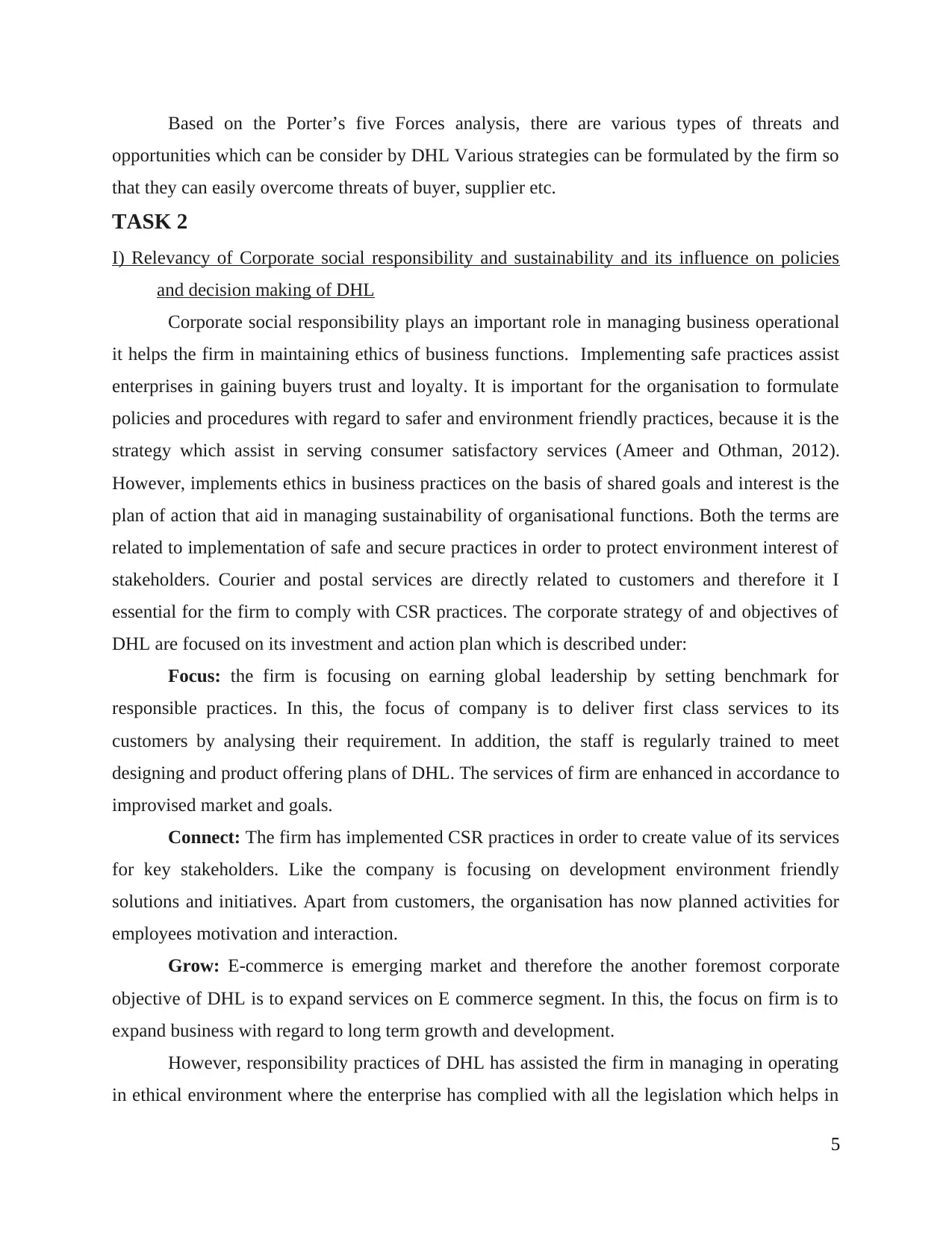
Based on the Porter’s five Forces analysis, there are various types of threats and
opportunities which can be consider by DHL Various strategies can be formulated by the firm so
that they can easily overcome threats of buyer, supplier etc.
TASK 2
I) Relevancy of Corporate social responsibility and sustainability and its influence on policies
and decision making of DHL
Corporate social responsibility plays an important role in managing business operational
it helps the firm in maintaining ethics of business functions. Implementing safe practices assist
enterprises in gaining buyers trust and loyalty. It is important for the organisation to formulate
policies and procedures with regard to safer and environment friendly practices, because it is the
strategy which assist in serving consumer satisfactory services (Ameer and Othman, 2012).
However, implements ethics in business practices on the basis of shared goals and interest is the
plan of action that aid in managing sustainability of organisational functions. Both the terms are
related to implementation of safe and secure practices in order to protect environment interest of
stakeholders. Courier and postal services are directly related to customers and therefore it I
essential for the firm to comply with CSR practices. The corporate strategy of and objectives of
DHL are focused on its investment and action plan which is described under:
Focus: the firm is focusing on earning global leadership by setting benchmark for
responsible practices. In this, the focus of company is to deliver first class services to its
customers by analysing their requirement. In addition, the staff is regularly trained to meet
designing and product offering plans of DHL. The services of firm are enhanced in accordance to
improvised market and goals.
Connect: The firm has implemented CSR practices in order to create value of its services
for key stakeholders. Like the company is focusing on development environment friendly
solutions and initiatives. Apart from customers, the organisation has now planned activities for
employees motivation and interaction.
Grow: E-commerce is emerging market and therefore the another foremost corporate
objective of DHL is to expand services on E commerce segment. In this, the focus on firm is to
expand business with regard to long term growth and development.
However, responsibility practices of DHL has assisted the firm in managing in operating
in ethical environment where the enterprise has complied with all the legislation which helps in
5
opportunities which can be consider by DHL Various strategies can be formulated by the firm so
that they can easily overcome threats of buyer, supplier etc.
TASK 2
I) Relevancy of Corporate social responsibility and sustainability and its influence on policies
and decision making of DHL
Corporate social responsibility plays an important role in managing business operational
it helps the firm in maintaining ethics of business functions. Implementing safe practices assist
enterprises in gaining buyers trust and loyalty. It is important for the organisation to formulate
policies and procedures with regard to safer and environment friendly practices, because it is the
strategy which assist in serving consumer satisfactory services (Ameer and Othman, 2012).
However, implements ethics in business practices on the basis of shared goals and interest is the
plan of action that aid in managing sustainability of organisational functions. Both the terms are
related to implementation of safe and secure practices in order to protect environment interest of
stakeholders. Courier and postal services are directly related to customers and therefore it I
essential for the firm to comply with CSR practices. The corporate strategy of and objectives of
DHL are focused on its investment and action plan which is described under:
Focus: the firm is focusing on earning global leadership by setting benchmark for
responsible practices. In this, the focus of company is to deliver first class services to its
customers by analysing their requirement. In addition, the staff is regularly trained to meet
designing and product offering plans of DHL. The services of firm are enhanced in accordance to
improvised market and goals.
Connect: The firm has implemented CSR practices in order to create value of its services
for key stakeholders. Like the company is focusing on development environment friendly
solutions and initiatives. Apart from customers, the organisation has now planned activities for
employees motivation and interaction.
Grow: E-commerce is emerging market and therefore the another foremost corporate
objective of DHL is to expand services on E commerce segment. In this, the focus on firm is to
expand business with regard to long term growth and development.
However, responsibility practices of DHL has assisted the firm in managing in operating
in ethical environment where the enterprise has complied with all the legislation which helps in
5
Paraphrase This Document
Need a fresh take? Get an instant paraphrase of this document with our AI Paraphraser
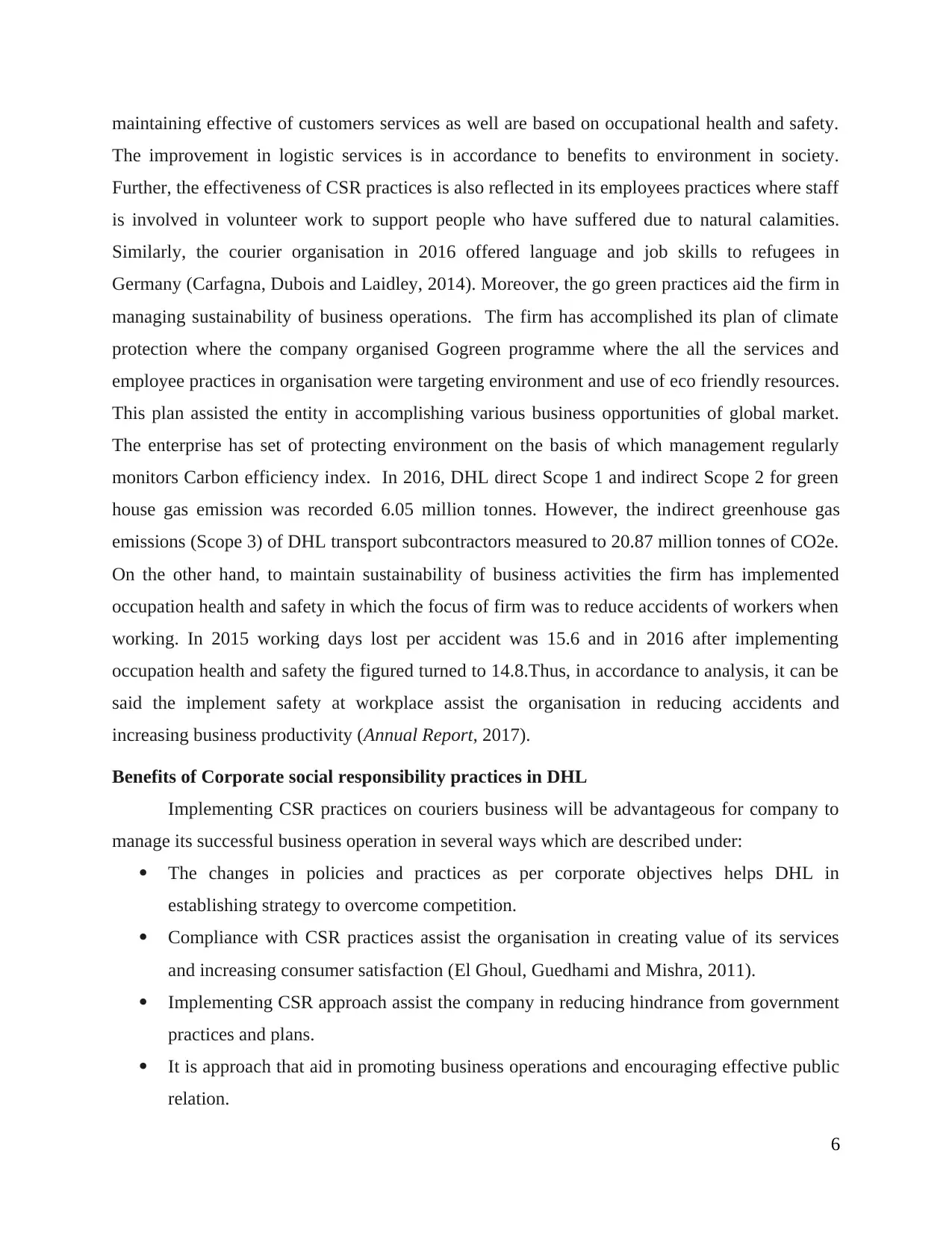
maintaining effective of customers services as well are based on occupational health and safety.
The improvement in logistic services is in accordance to benefits to environment in society.
Further, the effectiveness of CSR practices is also reflected in its employees practices where staff
is involved in volunteer work to support people who have suffered due to natural calamities.
Similarly, the courier organisation in 2016 offered language and job skills to refugees in
Germany (Carfagna, Dubois and Laidley, 2014). Moreover, the go green practices aid the firm in
managing sustainability of business operations. The firm has accomplished its plan of climate
protection where the company organised Gogreen programme where the all the services and
employee practices in organisation were targeting environment and use of eco friendly resources.
This plan assisted the entity in accomplishing various business opportunities of global market.
The enterprise has set of protecting environment on the basis of which management regularly
monitors Carbon efficiency index. In 2016, DHL direct Scope 1 and indirect Scope 2 for green
house gas emission was recorded 6.05 million tonnes. However, the indirect greenhouse gas
emissions (Scope 3) of DHL transport subcontractors measured to 20.87 million tonnes of CO2e.
On the other hand, to maintain sustainability of business activities the firm has implemented
occupation health and safety in which the focus of firm was to reduce accidents of workers when
working. In 2015 working days lost per accident was 15.6 and in 2016 after implementing
occupation health and safety the figured turned to 14.8.Thus, in accordance to analysis, it can be
said the implement safety at workplace assist the organisation in reducing accidents and
increasing business productivity (Annual Report, 2017).
Benefits of Corporate social responsibility practices in DHL
Implementing CSR practices on couriers business will be advantageous for company to
manage its successful business operation in several ways which are described under:
The changes in policies and practices as per corporate objectives helps DHL in
establishing strategy to overcome competition.
Compliance with CSR practices assist the organisation in creating value of its services
and increasing consumer satisfaction (El Ghoul, Guedhami and Mishra, 2011).
Implementing CSR approach assist the company in reducing hindrance from government
practices and plans.
It is approach that aid in promoting business operations and encouraging effective public
relation.
6
The improvement in logistic services is in accordance to benefits to environment in society.
Further, the effectiveness of CSR practices is also reflected in its employees practices where staff
is involved in volunteer work to support people who have suffered due to natural calamities.
Similarly, the courier organisation in 2016 offered language and job skills to refugees in
Germany (Carfagna, Dubois and Laidley, 2014). Moreover, the go green practices aid the firm in
managing sustainability of business operations. The firm has accomplished its plan of climate
protection where the company organised Gogreen programme where the all the services and
employee practices in organisation were targeting environment and use of eco friendly resources.
This plan assisted the entity in accomplishing various business opportunities of global market.
The enterprise has set of protecting environment on the basis of which management regularly
monitors Carbon efficiency index. In 2016, DHL direct Scope 1 and indirect Scope 2 for green
house gas emission was recorded 6.05 million tonnes. However, the indirect greenhouse gas
emissions (Scope 3) of DHL transport subcontractors measured to 20.87 million tonnes of CO2e.
On the other hand, to maintain sustainability of business activities the firm has implemented
occupation health and safety in which the focus of firm was to reduce accidents of workers when
working. In 2015 working days lost per accident was 15.6 and in 2016 after implementing
occupation health and safety the figured turned to 14.8.Thus, in accordance to analysis, it can be
said the implement safety at workplace assist the organisation in reducing accidents and
increasing business productivity (Annual Report, 2017).
Benefits of Corporate social responsibility practices in DHL
Implementing CSR practices on couriers business will be advantageous for company to
manage its successful business operation in several ways which are described under:
The changes in policies and practices as per corporate objectives helps DHL in
establishing strategy to overcome competition.
Compliance with CSR practices assist the organisation in creating value of its services
and increasing consumer satisfaction (El Ghoul, Guedhami and Mishra, 2011).
Implementing CSR approach assist the company in reducing hindrance from government
practices and plans.
It is approach that aid in promoting business operations and encouraging effective public
relation.
6
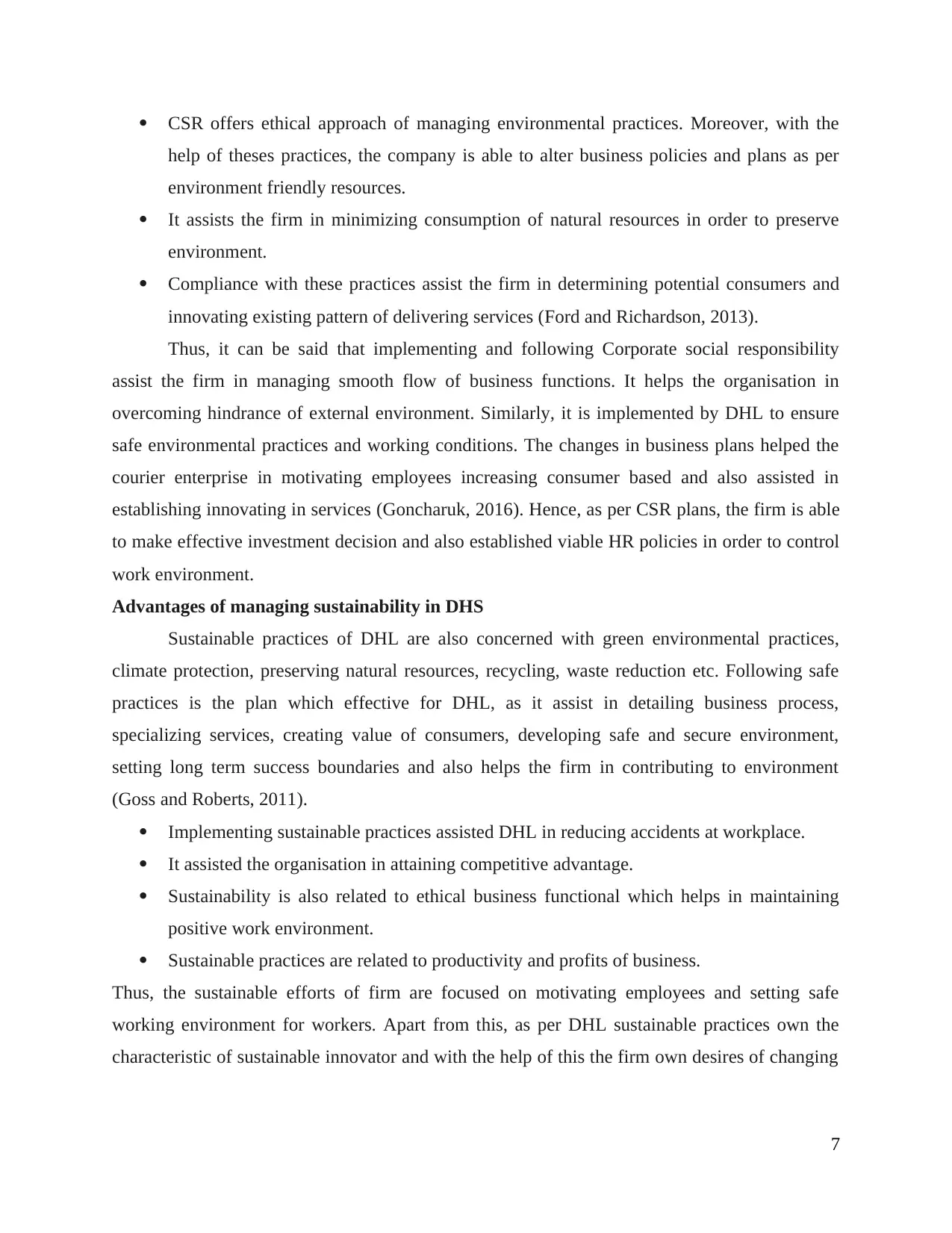
CSR offers ethical approach of managing environmental practices. Moreover, with the
help of theses practices, the company is able to alter business policies and plans as per
environment friendly resources.
It assists the firm in minimizing consumption of natural resources in order to preserve
environment.
Compliance with these practices assist the firm in determining potential consumers and
innovating existing pattern of delivering services (Ford and Richardson, 2013).
Thus, it can be said that implementing and following Corporate social responsibility
assist the firm in managing smooth flow of business functions. It helps the organisation in
overcoming hindrance of external environment. Similarly, it is implemented by DHL to ensure
safe environmental practices and working conditions. The changes in business plans helped the
courier enterprise in motivating employees increasing consumer based and also assisted in
establishing innovating in services (Goncharuk, 2016). Hence, as per CSR plans, the firm is able
to make effective investment decision and also established viable HR policies in order to control
work environment.
Advantages of managing sustainability in DHS
Sustainable practices of DHL are also concerned with green environmental practices,
climate protection, preserving natural resources, recycling, waste reduction etc. Following safe
practices is the plan which effective for DHL, as it assist in detailing business process,
specializing services, creating value of consumers, developing safe and secure environment,
setting long term success boundaries and also helps the firm in contributing to environment
(Goss and Roberts, 2011).
Implementing sustainable practices assisted DHL in reducing accidents at workplace.
It assisted the organisation in attaining competitive advantage.
Sustainability is also related to ethical business functional which helps in maintaining
positive work environment.
Sustainable practices are related to productivity and profits of business.
Thus, the sustainable efforts of firm are focused on motivating employees and setting safe
working environment for workers. Apart from this, as per DHL sustainable practices own the
characteristic of sustainable innovator and with the help of this the firm own desires of changing
7
help of theses practices, the company is able to alter business policies and plans as per
environment friendly resources.
It assists the firm in minimizing consumption of natural resources in order to preserve
environment.
Compliance with these practices assist the firm in determining potential consumers and
innovating existing pattern of delivering services (Ford and Richardson, 2013).
Thus, it can be said that implementing and following Corporate social responsibility
assist the firm in managing smooth flow of business functions. It helps the organisation in
overcoming hindrance of external environment. Similarly, it is implemented by DHL to ensure
safe environmental practices and working conditions. The changes in business plans helped the
courier enterprise in motivating employees increasing consumer based and also assisted in
establishing innovating in services (Goncharuk, 2016). Hence, as per CSR plans, the firm is able
to make effective investment decision and also established viable HR policies in order to control
work environment.
Advantages of managing sustainability in DHS
Sustainable practices of DHL are also concerned with green environmental practices,
climate protection, preserving natural resources, recycling, waste reduction etc. Following safe
practices is the plan which effective for DHL, as it assist in detailing business process,
specializing services, creating value of consumers, developing safe and secure environment,
setting long term success boundaries and also helps the firm in contributing to environment
(Goss and Roberts, 2011).
Implementing sustainable practices assisted DHL in reducing accidents at workplace.
It assisted the organisation in attaining competitive advantage.
Sustainability is also related to ethical business functional which helps in maintaining
positive work environment.
Sustainable practices are related to productivity and profits of business.
Thus, the sustainable efforts of firm are focused on motivating employees and setting safe
working environment for workers. Apart from this, as per DHL sustainable practices own the
characteristic of sustainable innovator and with the help of this the firm own desires of changing
7
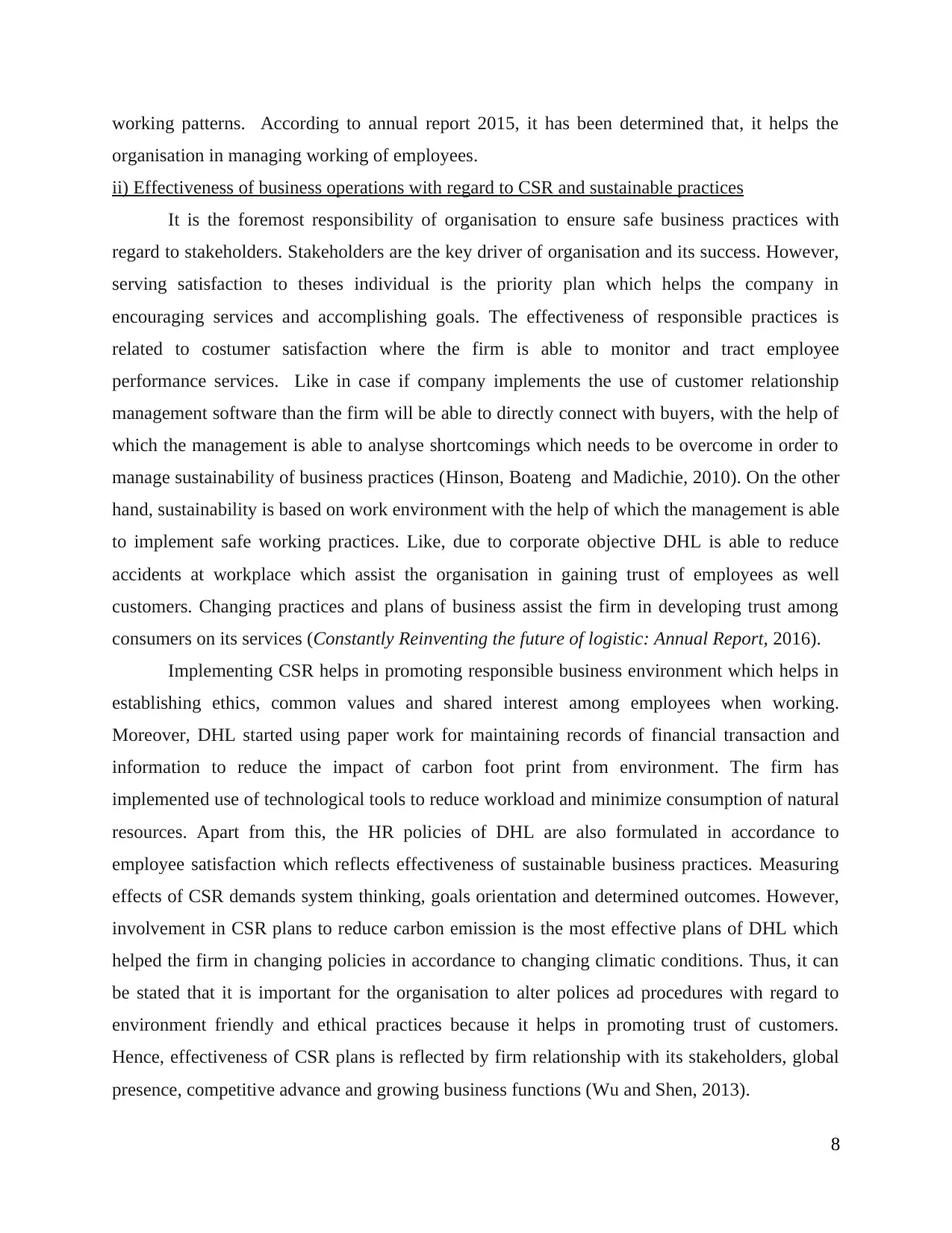
working patterns. According to annual report 2015, it has been determined that, it helps the
organisation in managing working of employees.
ii) Effectiveness of business operations with regard to CSR and sustainable practices
It is the foremost responsibility of organisation to ensure safe business practices with
regard to stakeholders. Stakeholders are the key driver of organisation and its success. However,
serving satisfaction to theses individual is the priority plan which helps the company in
encouraging services and accomplishing goals. The effectiveness of responsible practices is
related to costumer satisfaction where the firm is able to monitor and tract employee
performance services. Like in case if company implements the use of customer relationship
management software than the firm will be able to directly connect with buyers, with the help of
which the management is able to analyse shortcomings which needs to be overcome in order to
manage sustainability of business practices (Hinson, Boateng and Madichie, 2010). On the other
hand, sustainability is based on work environment with the help of which the management is able
to implement safe working practices. Like, due to corporate objective DHL is able to reduce
accidents at workplace which assist the organisation in gaining trust of employees as well
customers. Changing practices and plans of business assist the firm in developing trust among
consumers on its services (Constantly Reinventing the future of logistic: Annual Report, 2016).
Implementing CSR helps in promoting responsible business environment which helps in
establishing ethics, common values and shared interest among employees when working.
Moreover, DHL started using paper work for maintaining records of financial transaction and
information to reduce the impact of carbon foot print from environment. The firm has
implemented use of technological tools to reduce workload and minimize consumption of natural
resources. Apart from this, the HR policies of DHL are also formulated in accordance to
employee satisfaction which reflects effectiveness of sustainable business practices. Measuring
effects of CSR demands system thinking, goals orientation and determined outcomes. However,
involvement in CSR plans to reduce carbon emission is the most effective plans of DHL which
helped the firm in changing policies in accordance to changing climatic conditions. Thus, it can
be stated that it is important for the organisation to alter polices ad procedures with regard to
environment friendly and ethical practices because it helps in promoting trust of customers.
Hence, effectiveness of CSR plans is reflected by firm relationship with its stakeholders, global
presence, competitive advance and growing business functions (Wu and Shen, 2013).
8
organisation in managing working of employees.
ii) Effectiveness of business operations with regard to CSR and sustainable practices
It is the foremost responsibility of organisation to ensure safe business practices with
regard to stakeholders. Stakeholders are the key driver of organisation and its success. However,
serving satisfaction to theses individual is the priority plan which helps the company in
encouraging services and accomplishing goals. The effectiveness of responsible practices is
related to costumer satisfaction where the firm is able to monitor and tract employee
performance services. Like in case if company implements the use of customer relationship
management software than the firm will be able to directly connect with buyers, with the help of
which the management is able to analyse shortcomings which needs to be overcome in order to
manage sustainability of business practices (Hinson, Boateng and Madichie, 2010). On the other
hand, sustainability is based on work environment with the help of which the management is able
to implement safe working practices. Like, due to corporate objective DHL is able to reduce
accidents at workplace which assist the organisation in gaining trust of employees as well
customers. Changing practices and plans of business assist the firm in developing trust among
consumers on its services (Constantly Reinventing the future of logistic: Annual Report, 2016).
Implementing CSR helps in promoting responsible business environment which helps in
establishing ethics, common values and shared interest among employees when working.
Moreover, DHL started using paper work for maintaining records of financial transaction and
information to reduce the impact of carbon foot print from environment. The firm has
implemented use of technological tools to reduce workload and minimize consumption of natural
resources. Apart from this, the HR policies of DHL are also formulated in accordance to
employee satisfaction which reflects effectiveness of sustainable business practices. Measuring
effects of CSR demands system thinking, goals orientation and determined outcomes. However,
involvement in CSR plans to reduce carbon emission is the most effective plans of DHL which
helped the firm in changing policies in accordance to changing climatic conditions. Thus, it can
be stated that it is important for the organisation to alter polices ad procedures with regard to
environment friendly and ethical practices because it helps in promoting trust of customers.
Hence, effectiveness of CSR plans is reflected by firm relationship with its stakeholders, global
presence, competitive advance and growing business functions (Wu and Shen, 2013).
8
Secure Best Marks with AI Grader
Need help grading? Try our AI Grader for instant feedback on your assignments.
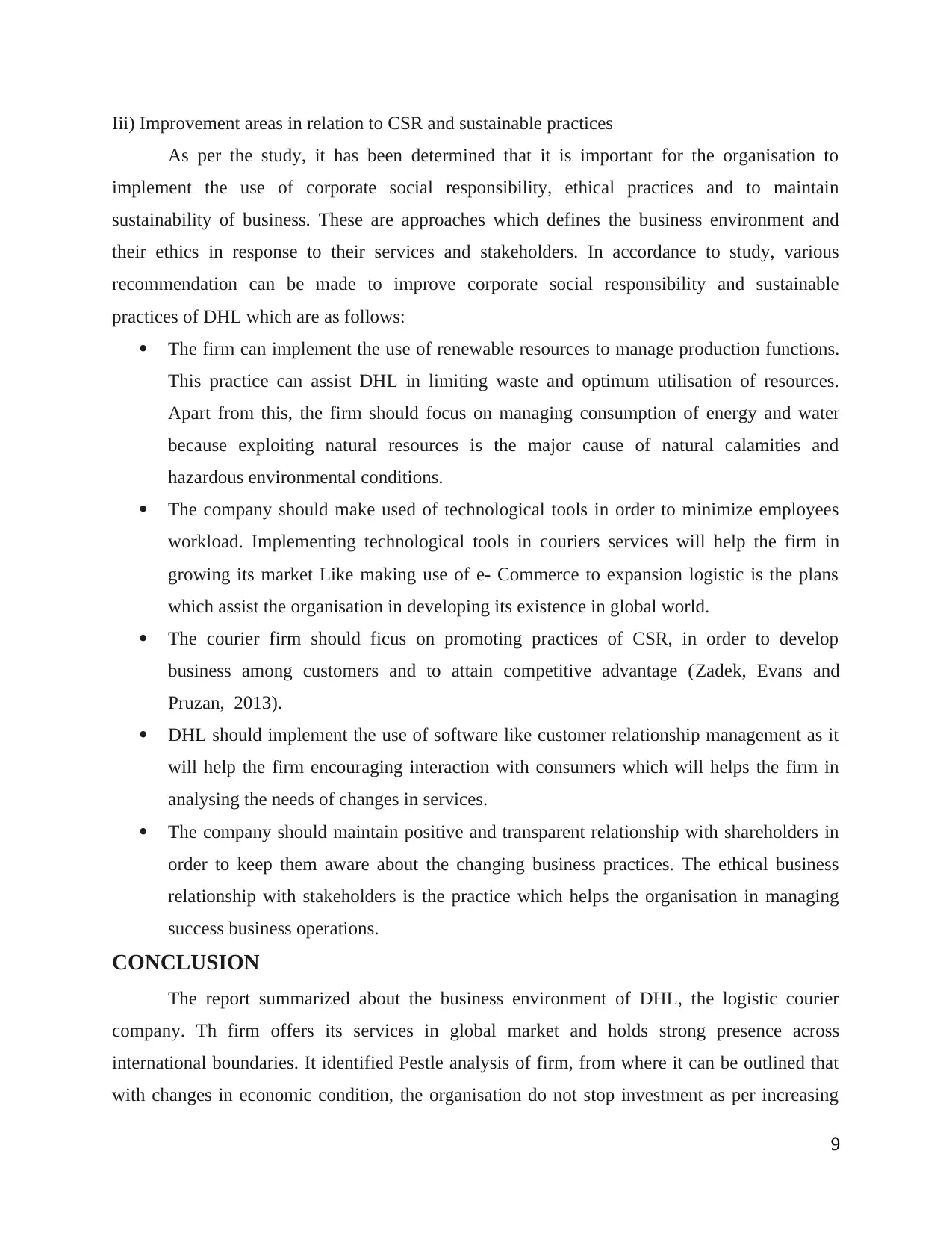
Iii) Improvement areas in relation to CSR and sustainable practices
As per the study, it has been determined that it is important for the organisation to
implement the use of corporate social responsibility, ethical practices and to maintain
sustainability of business. These are approaches which defines the business environment and
their ethics in response to their services and stakeholders. In accordance to study, various
recommendation can be made to improve corporate social responsibility and sustainable
practices of DHL which are as follows:
The firm can implement the use of renewable resources to manage production functions.
This practice can assist DHL in limiting waste and optimum utilisation of resources.
Apart from this, the firm should focus on managing consumption of energy and water
because exploiting natural resources is the major cause of natural calamities and
hazardous environmental conditions.
The company should make used of technological tools in order to minimize employees
workload. Implementing technological tools in couriers services will help the firm in
growing its market Like making use of e- Commerce to expansion logistic is the plans
which assist the organisation in developing its existence in global world.
The courier firm should ficus on promoting practices of CSR, in order to develop
business among customers and to attain competitive advantage (Zadek, Evans and
Pruzan, 2013).
DHL should implement the use of software like customer relationship management as it
will help the firm encouraging interaction with consumers which will helps the firm in
analysing the needs of changes in services.
The company should maintain positive and transparent relationship with shareholders in
order to keep them aware about the changing business practices. The ethical business
relationship with stakeholders is the practice which helps the organisation in managing
success business operations.
CONCLUSION
The report summarized about the business environment of DHL, the logistic courier
company. Th firm offers its services in global market and holds strong presence across
international boundaries. It identified Pestle analysis of firm, from where it can be outlined that
with changes in economic condition, the organisation do not stop investment as per increasing
9
As per the study, it has been determined that it is important for the organisation to
implement the use of corporate social responsibility, ethical practices and to maintain
sustainability of business. These are approaches which defines the business environment and
their ethics in response to their services and stakeholders. In accordance to study, various
recommendation can be made to improve corporate social responsibility and sustainable
practices of DHL which are as follows:
The firm can implement the use of renewable resources to manage production functions.
This practice can assist DHL in limiting waste and optimum utilisation of resources.
Apart from this, the firm should focus on managing consumption of energy and water
because exploiting natural resources is the major cause of natural calamities and
hazardous environmental conditions.
The company should make used of technological tools in order to minimize employees
workload. Implementing technological tools in couriers services will help the firm in
growing its market Like making use of e- Commerce to expansion logistic is the plans
which assist the organisation in developing its existence in global world.
The courier firm should ficus on promoting practices of CSR, in order to develop
business among customers and to attain competitive advantage (Zadek, Evans and
Pruzan, 2013).
DHL should implement the use of software like customer relationship management as it
will help the firm encouraging interaction with consumers which will helps the firm in
analysing the needs of changes in services.
The company should maintain positive and transparent relationship with shareholders in
order to keep them aware about the changing business practices. The ethical business
relationship with stakeholders is the practice which helps the organisation in managing
success business operations.
CONCLUSION
The report summarized about the business environment of DHL, the logistic courier
company. Th firm offers its services in global market and holds strong presence across
international boundaries. It identified Pestle analysis of firm, from where it can be outlined that
with changes in economic condition, the organisation do not stop investment as per increasing
9
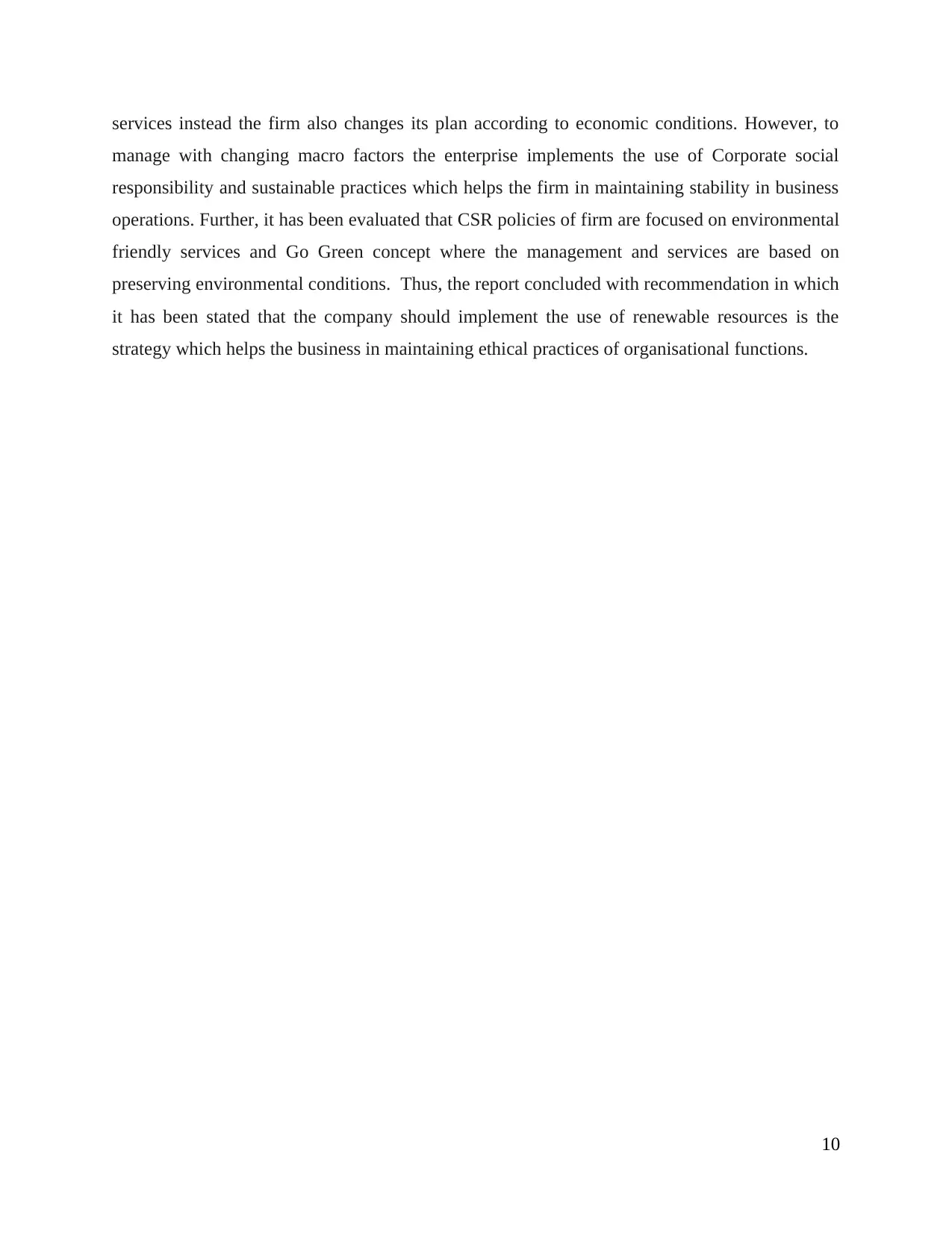
services instead the firm also changes its plan according to economic conditions. However, to
manage with changing macro factors the enterprise implements the use of Corporate social
responsibility and sustainable practices which helps the firm in maintaining stability in business
operations. Further, it has been evaluated that CSR policies of firm are focused on environmental
friendly services and Go Green concept where the management and services are based on
preserving environmental conditions. Thus, the report concluded with recommendation in which
it has been stated that the company should implement the use of renewable resources is the
strategy which helps the business in maintaining ethical practices of organisational functions.
10
manage with changing macro factors the enterprise implements the use of Corporate social
responsibility and sustainable practices which helps the firm in maintaining stability in business
operations. Further, it has been evaluated that CSR policies of firm are focused on environmental
friendly services and Go Green concept where the management and services are based on
preserving environmental conditions. Thus, the report concluded with recommendation in which
it has been stated that the company should implement the use of renewable resources is the
strategy which helps the business in maintaining ethical practices of organisational functions.
10
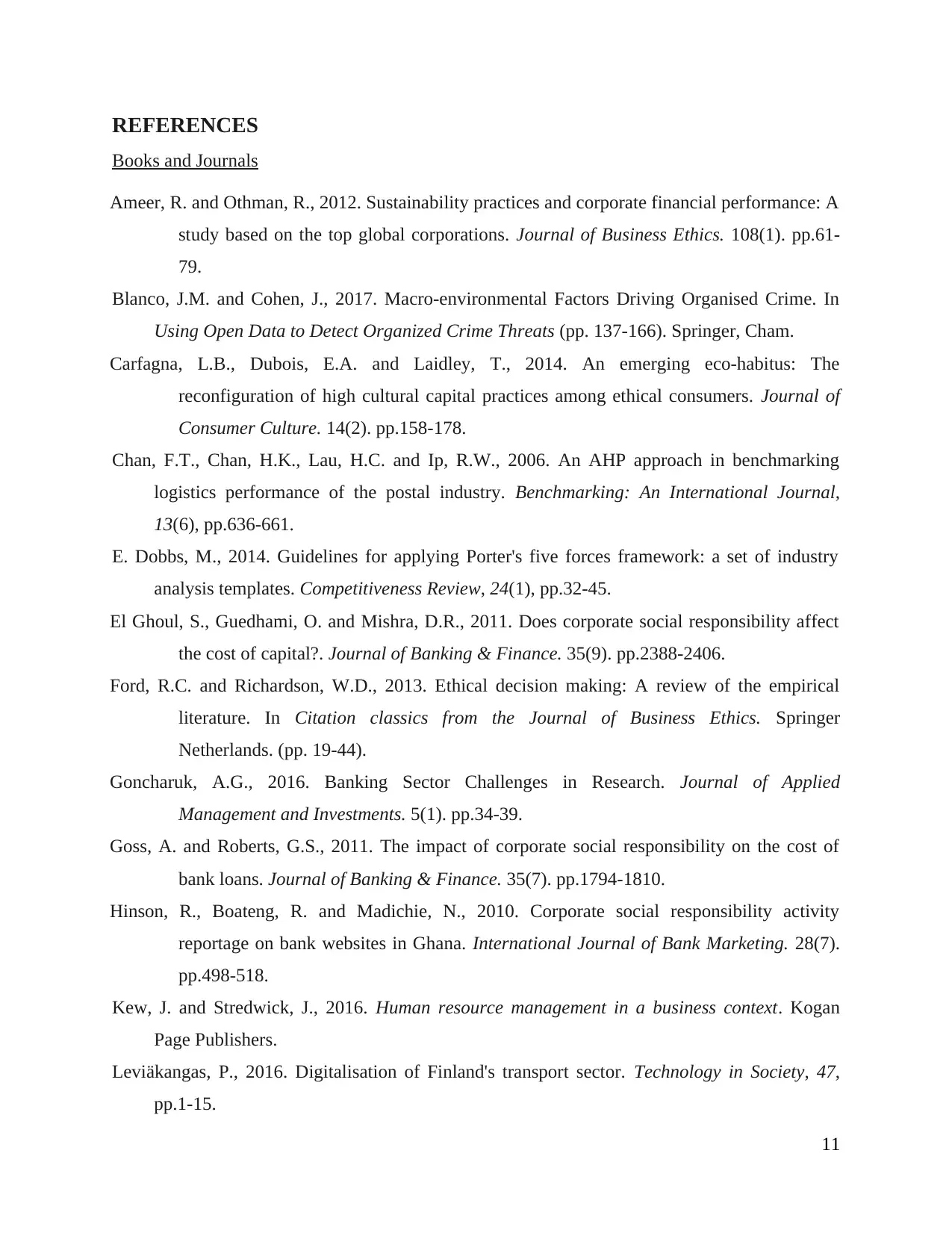
REFERENCES
Books and Journals
Ameer, R. and Othman, R., 2012. Sustainability practices and corporate financial performance: A
study based on the top global corporations. Journal of Business Ethics. 108(1). pp.61-
79.
Blanco, J.M. and Cohen, J., 2017. Macro-environmental Factors Driving Organised Crime. In
Using Open Data to Detect Organized Crime Threats (pp. 137-166). Springer, Cham.
Carfagna, L.B., Dubois, E.A. and Laidley, T., 2014. An emerging eco-habitus: The
reconfiguration of high cultural capital practices among ethical consumers. Journal of
Consumer Culture. 14(2). pp.158-178.
Chan, F.T., Chan, H.K., Lau, H.C. and Ip, R.W., 2006. An AHP approach in benchmarking
logistics performance of the postal industry. Benchmarking: An International Journal,
13(6), pp.636-661.
E. Dobbs, M., 2014. Guidelines for applying Porter's five forces framework: a set of industry
analysis templates. Competitiveness Review, 24(1), pp.32-45.
El Ghoul, S., Guedhami, O. and Mishra, D.R., 2011. Does corporate social responsibility affect
the cost of capital?. Journal of Banking & Finance. 35(9). pp.2388-2406.
Ford, R.C. and Richardson, W.D., 2013. Ethical decision making: A review of the empirical
literature. In Citation classics from the Journal of Business Ethics. Springer
Netherlands. (pp. 19-44).
Goncharuk, A.G., 2016. Banking Sector Challenges in Research. Journal of Applied
Management and Investments. 5(1). pp.34-39.
Goss, A. and Roberts, G.S., 2011. The impact of corporate social responsibility on the cost of
bank loans. Journal of Banking & Finance. 35(7). pp.1794-1810.
Hinson, R., Boateng, R. and Madichie, N., 2010. Corporate social responsibility activity
reportage on bank websites in Ghana. International Journal of Bank Marketing. 28(7).
pp.498-518.
Kew, J. and Stredwick, J., 2016. Human resource management in a business context. Kogan
Page Publishers.
Leviäkangas, P., 2016. Digitalisation of Finland's transport sector. Technology in Society, 47,
pp.1-15.
11
Books and Journals
Ameer, R. and Othman, R., 2012. Sustainability practices and corporate financial performance: A
study based on the top global corporations. Journal of Business Ethics. 108(1). pp.61-
79.
Blanco, J.M. and Cohen, J., 2017. Macro-environmental Factors Driving Organised Crime. In
Using Open Data to Detect Organized Crime Threats (pp. 137-166). Springer, Cham.
Carfagna, L.B., Dubois, E.A. and Laidley, T., 2014. An emerging eco-habitus: The
reconfiguration of high cultural capital practices among ethical consumers. Journal of
Consumer Culture. 14(2). pp.158-178.
Chan, F.T., Chan, H.K., Lau, H.C. and Ip, R.W., 2006. An AHP approach in benchmarking
logistics performance of the postal industry. Benchmarking: An International Journal,
13(6), pp.636-661.
E. Dobbs, M., 2014. Guidelines for applying Porter's five forces framework: a set of industry
analysis templates. Competitiveness Review, 24(1), pp.32-45.
El Ghoul, S., Guedhami, O. and Mishra, D.R., 2011. Does corporate social responsibility affect
the cost of capital?. Journal of Banking & Finance. 35(9). pp.2388-2406.
Ford, R.C. and Richardson, W.D., 2013. Ethical decision making: A review of the empirical
literature. In Citation classics from the Journal of Business Ethics. Springer
Netherlands. (pp. 19-44).
Goncharuk, A.G., 2016. Banking Sector Challenges in Research. Journal of Applied
Management and Investments. 5(1). pp.34-39.
Goss, A. and Roberts, G.S., 2011. The impact of corporate social responsibility on the cost of
bank loans. Journal of Banking & Finance. 35(7). pp.1794-1810.
Hinson, R., Boateng, R. and Madichie, N., 2010. Corporate social responsibility activity
reportage on bank websites in Ghana. International Journal of Bank Marketing. 28(7).
pp.498-518.
Kew, J. and Stredwick, J., 2016. Human resource management in a business context. Kogan
Page Publishers.
Leviäkangas, P., 2016. Digitalisation of Finland's transport sector. Technology in Society, 47,
pp.1-15.
11
Paraphrase This Document
Need a fresh take? Get an instant paraphrase of this document with our AI Paraphraser
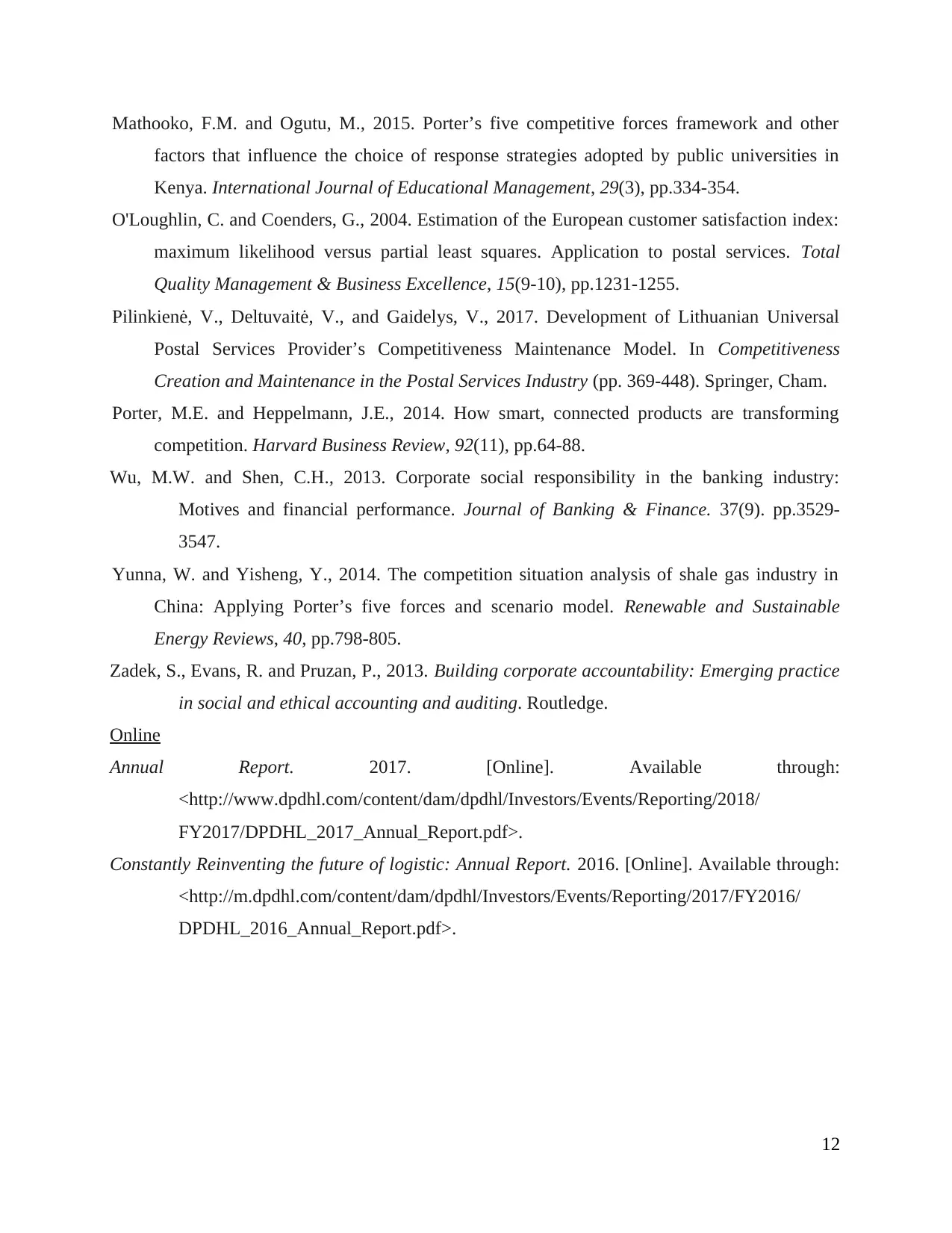
Mathooko, F.M. and Ogutu, M., 2015. Porter’s five competitive forces framework and other
factors that influence the choice of response strategies adopted by public universities in
Kenya. International Journal of Educational Management, 29(3), pp.334-354.
O'Loughlin, C. and Coenders, G., 2004. Estimation of the European customer satisfaction index:
maximum likelihood versus partial least squares. Application to postal services. Total
Quality Management & Business Excellence, 15(9-10), pp.1231-1255.
Pilinkienė, V., Deltuvaitė, V., and Gaidelys, V., 2017. Development of Lithuanian Universal
Postal Services Provider’s Competitiveness Maintenance Model. In Competitiveness
Creation and Maintenance in the Postal Services Industry (pp. 369-448). Springer, Cham.
Porter, M.E. and Heppelmann, J.E., 2014. How smart, connected products are transforming
competition. Harvard Business Review, 92(11), pp.64-88.
Wu, M.W. and Shen, C.H., 2013. Corporate social responsibility in the banking industry:
Motives and financial performance. Journal of Banking & Finance. 37(9). pp.3529-
3547.
Yunna, W. and Yisheng, Y., 2014. The competition situation analysis of shale gas industry in
China: Applying Porter’s five forces and scenario model. Renewable and Sustainable
Energy Reviews, 40, pp.798-805.
Zadek, S., Evans, R. and Pruzan, P., 2013. Building corporate accountability: Emerging practice
in social and ethical accounting and auditing. Routledge.
Online
Annual Report. 2017. [Online]. Available through:
<http://www.dpdhl.com/content/dam/dpdhl/Investors/Events/Reporting/2018/
FY2017/DPDHL_2017_Annual_Report.pdf>.
Constantly Reinventing the future of logistic: Annual Report. 2016. [Online]. Available through:
<http://m.dpdhl.com/content/dam/dpdhl/Investors/Events/Reporting/2017/FY2016/
DPDHL_2016_Annual_Report.pdf>.
12
factors that influence the choice of response strategies adopted by public universities in
Kenya. International Journal of Educational Management, 29(3), pp.334-354.
O'Loughlin, C. and Coenders, G., 2004. Estimation of the European customer satisfaction index:
maximum likelihood versus partial least squares. Application to postal services. Total
Quality Management & Business Excellence, 15(9-10), pp.1231-1255.
Pilinkienė, V., Deltuvaitė, V., and Gaidelys, V., 2017. Development of Lithuanian Universal
Postal Services Provider’s Competitiveness Maintenance Model. In Competitiveness
Creation and Maintenance in the Postal Services Industry (pp. 369-448). Springer, Cham.
Porter, M.E. and Heppelmann, J.E., 2014. How smart, connected products are transforming
competition. Harvard Business Review, 92(11), pp.64-88.
Wu, M.W. and Shen, C.H., 2013. Corporate social responsibility in the banking industry:
Motives and financial performance. Journal of Banking & Finance. 37(9). pp.3529-
3547.
Yunna, W. and Yisheng, Y., 2014. The competition situation analysis of shale gas industry in
China: Applying Porter’s five forces and scenario model. Renewable and Sustainable
Energy Reviews, 40, pp.798-805.
Zadek, S., Evans, R. and Pruzan, P., 2013. Building corporate accountability: Emerging practice
in social and ethical accounting and auditing. Routledge.
Online
Annual Report. 2017. [Online]. Available through:
<http://www.dpdhl.com/content/dam/dpdhl/Investors/Events/Reporting/2018/
FY2017/DPDHL_2017_Annual_Report.pdf>.
Constantly Reinventing the future of logistic: Annual Report. 2016. [Online]. Available through:
<http://m.dpdhl.com/content/dam/dpdhl/Investors/Events/Reporting/2017/FY2016/
DPDHL_2016_Annual_Report.pdf>.
12
1 out of 14
Your All-in-One AI-Powered Toolkit for Academic Success.
+13062052269
info@desklib.com
Available 24*7 on WhatsApp / Email
![[object Object]](/_next/static/media/star-bottom.7253800d.svg)
Unlock your academic potential
© 2024 | Zucol Services PVT LTD | All rights reserved.




